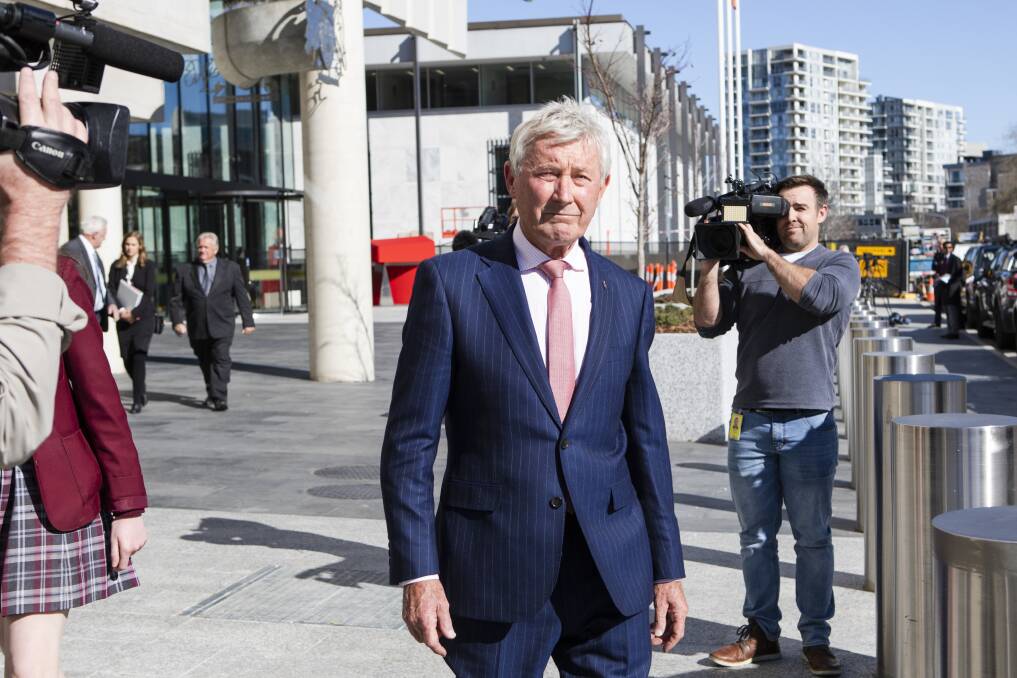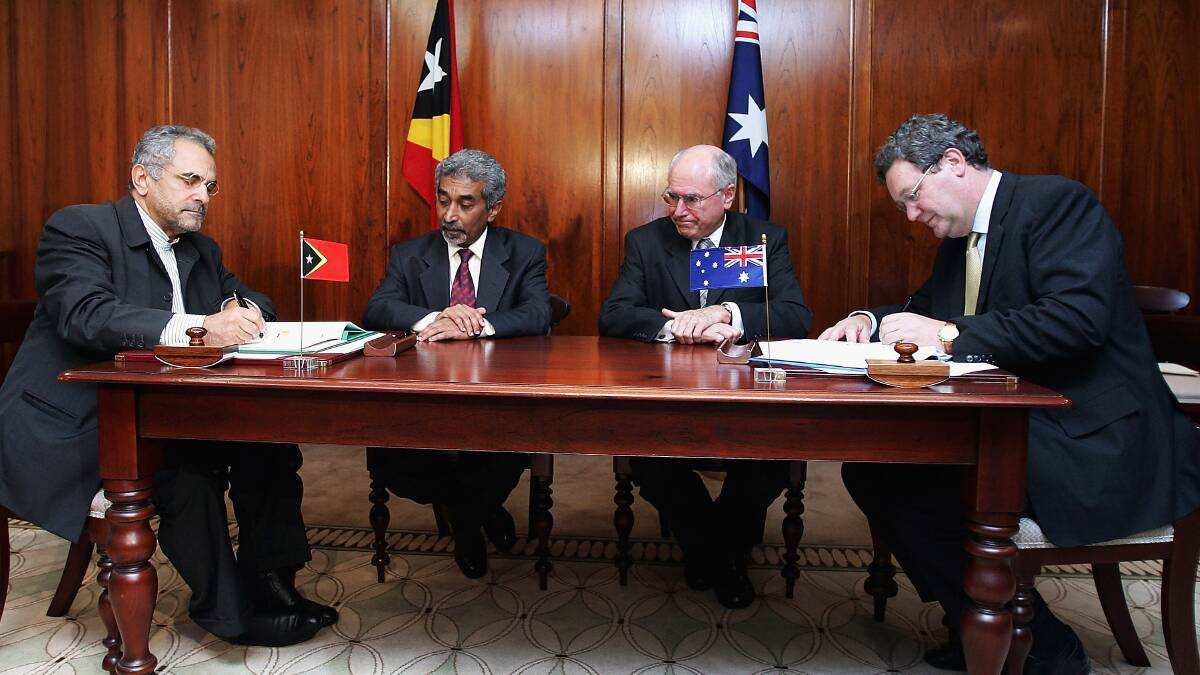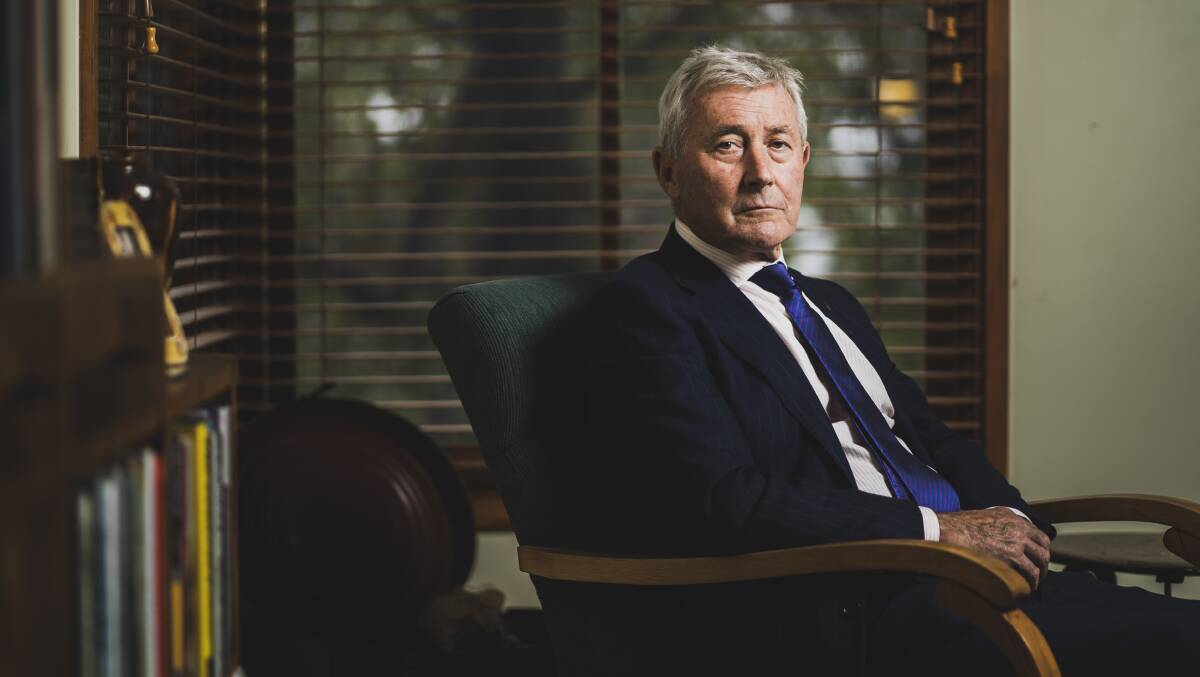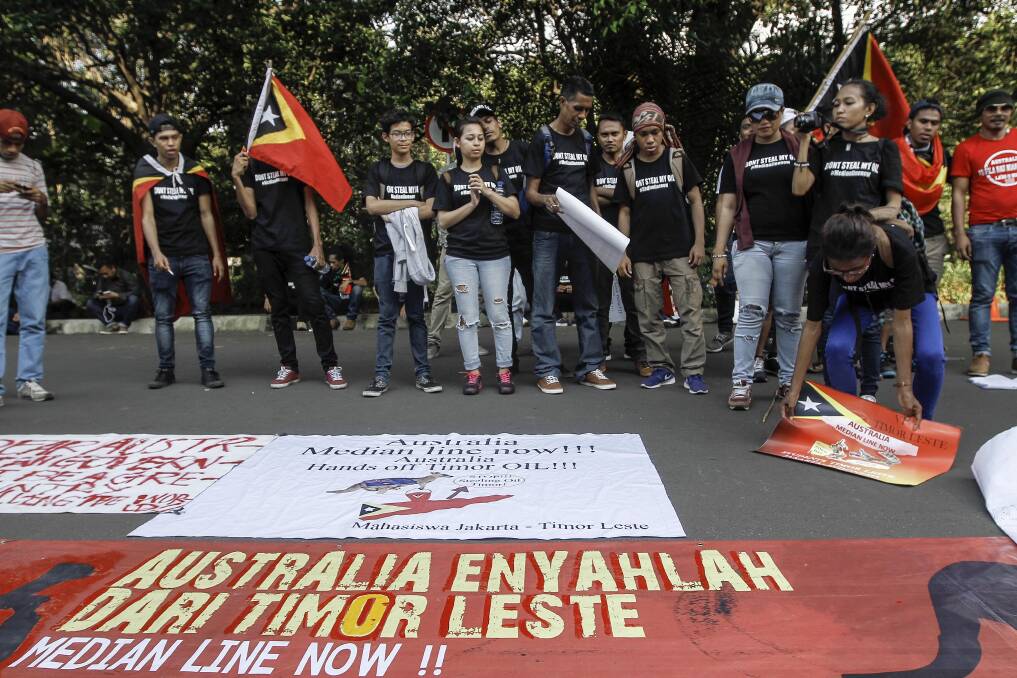
The following is a lightly edited extract from barrister Bernard Collaery's new book, Oil Under Troubled Water - Australia's Timor Sea Intrigue, published by Melbourne University.
Subscribe now for unlimited access.
or signup to continue reading
The OPEC crisis and Australian neo-imperialism
While mouthing support at the UN for legitimate nationalist struggles and accepting that European colonialism was giving way to the "wind of change", particularly in Africa, Australia embarked in the mid-1960s on a new imperialism that would lead Canberra to share the spoils of invasion, turn a blind eye to genocide and compromise Australia's virtue won by earlier generations of Australians who had pioneered, fought and died for a "fair-go" social democracy. This betrayal was supported, even led, by certain senior Canberra bureaucrats who held not to the value of true public service.
In 1970, when Australia began negotiations in earnest with Indonesia over maritime boundary delimitations in the Arafura and Timor seas, Australia knew enough about the petroleum potential of the Timor Sea adjoining Portuguese Timor to review the economic assumption underpinning the earlier cabinet appreciation that an independent Timor-Leste would not be economically viable. Instead, Australia set about a course to access the seabed resources for itself, despite earlier advice by David Fairbairn, Australia's minister for national development, that the claim was of doubtful legitimacy.
Uncertainty after the 1972 OPEC crisis heralded a new foreign policy imperative that brought the potential petroleum resources of the Australian Continental Shelf under the Timor Sea to the surface in Canberra. Thereafter, successive Australian governments sought to exert influence over Portuguese Timor and its seabed resources. Australia and Portugal commenced issuing overlapping exploration permits, which led to protests and counter-protests between Canberra and Lisbon.
The move by FRETILIN that leapfrogged an orderly endorsement for independence by the UN General Assembly was exactly what the hawks from Canberra and Washington, now circling over Timor-Leste, were looking for.
In 1971 and 1972, Australia and Indonesia signed treaties with respect to the Australia/Indonesia interface in the Arafura and Timor seas, leaving what was to become the infamous "Timor Gap" at the Australia/Portuguese Timor interface. Meanwhile, elements of the loosely grouped independence movement in Timor-Leste were giving voice in New York to the call for independence from Portugal. On December 12, 1973, the General Assembly reaffirmed its support for the leadership of the national liberation movements in Angola, Cape Verde, Mozambique and Sao Tome by declaring those movements to be "authentic representatives of the peoples concerned".
The course of Timor-Leste history may have changed if a credible single voice for national unity had emerged from Dili. Instead, Timor-Leste was not included in the General Assembly's call upon all governments, specialised agencies and institutions associated with the UN to render to the peoples of four other of Portugal's overseas territories all moral and material assistance for the achievement of their national independence and the reconstruction of their countries.

Following the Carnation Revolution of April 25, 1974, in Lisbon the UN General Assembly noted moves in Lisbon to conform to UN Charter requirements with respect to Portuguese colonies. On July 27, 1974, the Portuguese Council of State decreed an acceptance of the right to self-determination of Portugal's overseas territories and the decision to waive so much of the Portuguese Constitution of 1933 as would prevent that. Just 12 months later, on July 17, 1975, the Portuguese Council of the Revolution, citing the law passed by the revolutionary Junta on July 27, 1974, reaffirmed the right of the people of Timor to self-determination in accordance with the relevant resolutions of the UN and, "with the strict observance of the principle of the respect of the will of the people of Timor", called upon the people of Timor by popular assembly constituted through direct, secretive universal election to decide their future.
The Council of the Revolution provided for a staged process whereby all prerogatives of sovereign administration of the Portuguese republic would cease in Timor by the third Sunday of October 1978. The Revolutionary Council set up a structure for the staged devolution of power in Timor-Leste. The July law passed in Lisbon set up a transitional council with various secretariats for the staged devolution of administrative responsibility in Timor. Despite the efforts made by the Revolutionary Council in Lisbon to create a staged devolution of power to Timor-Leste that would be supported at the UN, the FRETILIN (Frente Revolucionaria de Timor-Leste Independente) Party unilaterally declared independence for Timor-Leste on November 28, 1975.
Two days later, in response, other factions headed by the Uniao Democratica Timorense (UDT), Associacao Popular Democratica Timorense (APODETI), Kota and Partido Trabalhista either proclaimed their version of independence or called for the immediate integration of Timor into the Republic of Indonesia.

The move by FRETILIN that leapfrogged an orderly endorsement for independence by the UN General Assembly was exactly what the hawks from Canberra and Washington, now circling over Timor-Leste, were looking for.
The sorry tale of how Portuguese Timor, now a focus of concern in Washington, Canberra and Jakarta, was at this critical juncture left out of the anticipated UN endorsement of the proposals put forward by the Revolutionary Council in Lisbon is yet to be explained by the principal actors. The failure of the Timorese leadership to present a unified voice was a national tragedy in 1974 and is a timely reminder of the corrosive force in Dili of personality politics. It remains for the surviving leaders to provide the full history of the brutal internal struggle for power in Timor followed by the Indonesian invasion.
Invasion
Within a year, Australia's Labor prime minister Gough Whitlam had ignored principles long endorsed by his party that enshrined the rights of Portuguese Timor's peoples to self-determination. Plans by Australia, Indonesia and the US to forestall a perceived Marxist government in Dili reached fruition with a visit by President Ford and Secretary of State Kissinger to General Suharto in Jakarta. A week later Indonesia invaded Timor-Leste, landing paratroopers at Dili on December 7, 1975, and then commencing a seaborne invasion. Australia thereafter colluded with Jakarta to subjugate the Timorese people and expand international petroleum company access to petroleum resources belonging in international law to the Timorese.
Modern texts chronicle a pattern of conduct by Australia and Indonesia contrary to international law leading to the Treaty on the Zone of Cooperation in an Area between the Indonesian province of East Timor and the Northern Territory (Timor Gap Treaty) between Australia and Indonesia (also referred to as ZOCA or ZOC). Portugal argued before the International Court of Justice that the 1989 treaty was based on forcible territorial acquisition and as such conferred no treaty-making rights on Australia. Australia responded rather lamely that the absence of a clear condemnation by UN organs and the international community allowed Australia international recognition for its treaty with Indonesia. The court held that since Indonesia was not a party to the litigation the matter could not be heard.
It was against this background of unsettled international jurisprudence that in 1999 Timor-Leste achieved self-determination after a UN-supervised ballot, whereupon Indonesia unilaterally abrogated the 1989 Timor Gap Treaty. In response to this Australia secured during the UN mandate over Timor-Leste a "revalidation" of the 1989 treaty such that on Independence Day, May 20, 2002, the terms of the 1989 treaty became the Timor Sea Treaty between Timor-Leste and Australia.

Liberation
FRETILIN's uneasy commitment to democracy, which led the UN to withhold, so tragically, support for Timor-Leste's move to independence in 1974, still pertained in 1999. As the outcome of a UN-supervised autonomy or independence ballot unfolded, the UN assumed full governing power in Timor-Leste; but little had changed over the intervening 25 years. By early 2000 the same group of differing political parties reasserted their voices in Dili. The largest party, FRETILIN, with a controversial legacy, was now led by diaspora Timorese who had spent most of the years of Indonesian occupation in Angola, Mozambique and Australia. FRETILIN had also undergone a momentous change in March 1986 when Xanana Gusmao, as Commander of FALINTIL (Foras Armadas da Libertao Nacional de Timor-Leste), moved political control of the internal military resistance away from a party he could not democratise.
FRETILIN, still perceived by much of the population, who were unaware of the party's true state, as the party of active resistance, retained significant albeit uninformed support. Inexplicably, UN Secretary-General Kofi Annan overlooked FRETILIN's record and Congresso Nacional da Resistência Timorense (CNRT) leader Xanana Gusmao's call for a government of national unity and allowed his Special Representative in Timor-Leste, Sergio Vieira de Mello, to fashion an ersatz self-government by placing a FRETILIN-controlled cabinet composed largely of diaspora Timorese into power.
READ MORE:
Australian petroleum diplomacy
Not content with the 2002 Timor Sea Treaty, Australia moved in 2004 to secure advantageous revenue clauses in a further treaty. By 2006 the Alkatiri government had been chiselled into agreeing to a 50-year moratorium on maritime boundary delimitation while Australia exercised a free hand in Timor Sea areas that might otherwise belong to Timor-Leste in international law.
Using laws introduced to protect national security information Australia reacted aggressively after Timor-Leste launched international law proceedings against Australia in 2013. Despite a provisional decision of the International Court of Justice against Australia's actions, Australian authorities ignored the court's orders and sought to question Timor-Leste's legal advisers.
Why a civilised nation like Australia departed over many years both from the rule of law and from the "fair-go" principles espoused by its founders warrants further discussion. Incompetent and sly foreign policy together with oppressive policies at home have seen Australia lose any role it may have had in providing exemplary democratic leadership in the region in which it seeks a place. Regrettably, a full moral reckoning requires credible source information from within government archives. Awareness of who the reckoning might implicate has prompted the political order in Australia to withhold access to material that should be in the public domain.
- Bernard Collaery is an Australian solicitor, barrister and former ACT attorney-general who specialises in litigation in high-profile catastrophic personal injury cases. He has appeared as counsel in many criminal jury trials and advised the East Timor Resistance for more than 30 years as well as acted for East Timor at the International Court of Justice in relation to a maritime sea boundary dispute with Australia.
- Mr Collaery will appear in conversation about his book with Senator Andrew Wilkie in a free Canberra Times/ANU event on March 10 in Manning Clark Hall, Kambri Cultural Centre. Bookings via events@anu.edu.au or 6125 4144.

